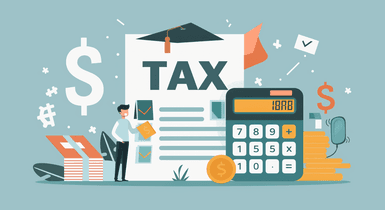Average Tax Refund: What You Need to Know
Contents

As an American taxpayer, you may face the situation of paying more taxes than needed. In this case, you may be eligible for a tax refund. So, what is the average tax refund, and how do you calculate it? What’s the best way to use your refund type, and what are the most common myths about this money? By the end of this article, you will know everything a taxpayer needs to know about the average tax return by income.
What Are the Key Factors Affecting Your Tax Refund?

Although an average tax refund is the amount of money that is reimbursed to the taxpayer by the government, it may not be as simple as it appears at first glance. Numerous factors influence average tax return amounts. Let’s examine a few of the most important considerations when predicting the amount of your potential refund.
- Income level. The amount of your income is one of the key points when filling out your return. The higher your earnings are, the higher your tax bill is, which means you can also expect a larger refund.
- Filing status. This factor has a significant impact when it comes to calculating your basic deductions, personal benefits, and income. The more favorable your tax regime is, the better your refund conditions will be.
- Deductions and credits. Deductions and credits can significantly reduce the amount of taxes you owe or increase your refund. You should review all information regarding this issue carefully to ensure you do not miss out on any benefits you may be entitled to.
- Sources of income. How you make money, whether through a regular job or investments, matters a lot when it comes to taxes.
- Type of deduction. You can choose between the standard deduction and the itemized deduction, depending on which one is more beneficial to you. The standard deduction model will reduce your taxable income by a fixed amount, but the itemized deduction can result in larger deductions for certain taxpayers.
- New life circumstances. Marriage, the birth of a child, or a new property can affect your tax liability, benefits, and, therefore, your refund.
- Tax legislation updates. Perhaps the most objective factor is changes at the legislative level that establish and regulate the mechanism for taxpayers to receive refunds.
Understanding IRS tax refunds processes helps you see why amounts vary so much across filers.
How to Determine Your Average Tax Refund Amount

To calculate the approximate potential tax refund you can hope for, you must consider all of the above factors and even more. This process is intricate, and the estimates can only be approximate, which might not match your expectations.
So, how much is the average tax return? Taxpayers pay not only federal income taxes but also Social Security and Medicare taxes, and so on. Therefore, the average tax refund by income chart is calculated by comparing your total income tax amount to the amount you paid in federal income taxes. If your federal income tax bill exceeds your income tax for the year, you will receive a payment of the difference.
To calculate your average tax refund by income as accurately as possible, you can consult with the IRS, seek help from a professional, or use some software. The functionality of online tax calculators will allow you to get a free estimate of your potential refund. To find out your estimated refund amount, you only need to enter information such as your filing status, income, deductions, and credits, and the calculator will calculate the refund you can expect.
What Are the Best Practices for Using Your Tax Refund?

So, what can you do with your tax refund? Receiving a refund is a windfall that provides you with a great opportunity to improve your financial situation. Don’t forget that you’ve been earning this money for the whole year, and it makes much more sense to use it to achieve your long-term financial goals.
Here are some of the most effective options for getting the most out of your tax refund.
- Smart investment strategies. Consider investing your money to grow it and generate passive income in the future—investing this money for the long term can give a boost to your financial well-being. You can invest your refund in savings accounts, certificates of deposit, or bonds. Still, perhaps the most profitable and, at the same time, the riskiest option, according to statistics, is the stock market. If you can afford to invest money for a long period, then you can hope to make good returns. Another interesting investment option is start-up capital for your own business. If you’ve always wanted to try yourself as an entrepreneur, getting a refund could be an excellent opportunity to make it happen. Additionally, exploring tactics like a backdoor Roth IRA maximize tax advantages may transform your refund into long-term gains.
- Debt repayment. If you have any outstanding loans or debts, the first thing you should spend money on is paying them off. Whether you owe money to a friend or a bank, use your refund to eliminate that expense from your budget. So, for example, making a larger mortgage payment will allow you to reduce the total loan amount and interest, while paying off high-interest credit card debt will save you from additional costs in the future.
- Saving for future expenses. One of the most win-win options is saving money for the future. You can use your refund to avoid taking out a high-interest loan for unexpected expenses. Increase your savings for financial emergencies—this will allow you to be prepared for layoffs, expensive medical treatment, or repairs. Plus, you can also defer your refund to fund your retirement, home purchase, or child education—consider these options instead of impulse purchases.
For digital-savvy users, reading a Cash App taxes review might clarify how this platform handles refunds and tax impacts.
Debunking the Most Common Misconceptions and Myths About Tax Refunds

And now let’s look at a few common mistakes regarding tax refunds.
Amount of compensation and financial status
There’s a common misconception that a bigger tax refund means a better financial situation. However, this isn’t necessarily true. Your refund is just the difference between what you’ve paid in taxes throughout the year and what you actually owe based on your income and deductions.
Effect of refund on future taxes
Being eligible for a tax refund means you’ve overpaid your taxes throughout the year, essentially giving the government an interest-free loan. While getting a refund may seem like a windfall, it’s important to consider the opportunity cost of having that money tied up with the government instead of earning interest or being used for other purposes.
“Free money”
A tax refund is not “gift” money from the government. This is the money that was withheld in each of your paychecks—you just overpaid it during the year, and now you get it back.
Using peer-to-peer services means you’ll also want to know how Venmo taxes handle new form requirements when refunds or payments are involved.
Final Thoughts
When it comes to the average tax return amount, your refund stands for the amount of taxes that you have overpaid and that the government gives you back. Although, at first glance, everything is clear, there are many factors that affect the average tax return. Always remember that your tax refund is money you have earned during the year, not a random gift from the government, so treat it as such—wisely, not wastefully.




